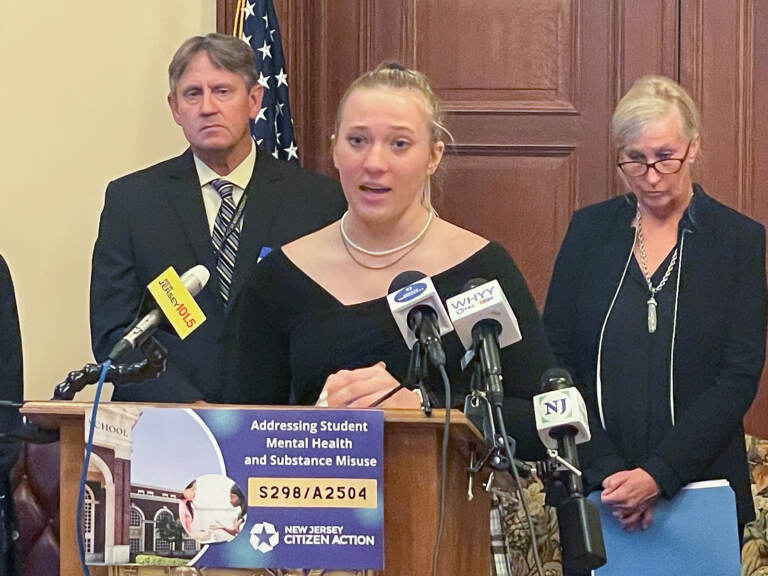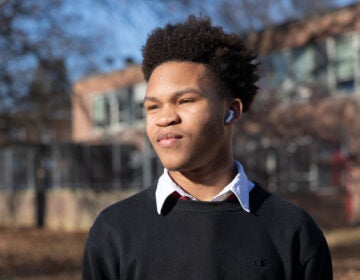Advocates urge N.J. to create statewide mental health screening program for high school students
New Jersey Citizen Action, with representatives from a South Jersey high school, is urging the Legislature to allow early health intervention for grades 9-12.

Emeline Kovac, a junior at Bordentown Regional High School, was in a pilot group for the SBIRT program at her school. She says the program allowed her to get the help she needed to focus in school and be more motivated overall. Her principal, Robert Walder, and Nell Geiger, a SAC Counselor at the school, look on. (P. Kenneth Burns/WHYY)
Advocates in Trenton are pushing the state Legislature to address a proposal that would establish universal screening of high school students at risk of mental health or substance misuse challenges.
New Jersey Citizen Action held a news conference Thursday to talk about the benefits of implementing a program known as SBIRT, Screening, Brief Intervention, and Referral to Treatment.
The program was piloted at Bordentown Regional High School in Burlington County two years ago. Of the 100 freshman students who were screened, more than half received a brief intervention, characterized as a “more in-depth conversation that is real.” About a quarter of the students who received brief interventions were referred for further counseling within the school or with an outside agency.
“For those students who trusted the process, a magical experience ensued,” said Nell Geiger, student assistance counselor (SAC) at Bordentown Regional High School. “We simply become a person who becomes a channel, a listener, and advocate; to break the silence for those who may be suffering alone.”
Emeline Kovac, a junior at the school, was among the first group of students who were screened. She credited the SBIRT program for helping her.
“I was able to seek counseling and get the help that I needed to be able to not only focus better in school, but be more motivated,” she said.
Kovac said she took the screening without realizing what it was, which, she added, “made it a lot easier to take it.”
“I felt free to say whatever I wanted and it wasn’t a lot of pressure,” she said of the questionnaire, adding that the word “screening” gets a bad reputation.
“The word kind of gives people a sense of being dug into or being violated, which is not what this screening is about at all,” she said.
Her principal, Robert Walder, said youth drug use and mental health problems were already “increasing at alarming rates” before the pandemic, but have now reached “tragic levels.” He called the program “a lifeline for this troubling trend that threatens so many young lives.”
Using SBIRT in schools is “an effective way to reach students broadly and preventatively,” Walder said, “in order to ensure no child is missed nor punished when issues of mental health or substance misuse occur.”
This is the fourth straight session that the bill has been proposed by state Sens. Joe Vitale and Teresa Ruiz. Vitale (D-Woodbridge) credited the Bordentown Regional School District for addressing the issue.
“They understand firsthand the challenges of identifying children, but also those that they know who are at risk,” he said. “These were issues that existed prior to the pandemic and since the pandemic…it has only gotten much worse, and we know why.”
Vitale and Assemblywoman Carol Murphy (D-Cinnaminson) said they will work to move the bill forward during the current legislative session.
The proposal is re-emerging as a recent study found that access to mental health resources for Black students declined over the course of a decade. If passed, the bill can help schools whose student populations are majority people of color who often don’t have resources, according to Laura Waddell, health care program director with New Jersey Citizen Action.
“They may not have a [student assistance] counselor like now. They may not even have a school nurse that’s devoted only to their school,” she said, adding that the SBIRT program allows schools to train school personnel. “It does not need to be a SAC counselor, it does not need to be a school nurse. It can, but it can also be a trusted voice, such as the football coach; someone who students will feel comfortable speaking with.”
Bordentown Regional High School is continuing to use the SBIRT program for freshman students. Geiger said the school will eventually expand the program.
“We still are waiting for approval for us to go forward with screening all of our students,” she said, referring to new district leadership.

Saturdays just got more interesting.
WHYY is your source for fact-based, in-depth journalism and information. As a nonprofit organization, we rely on financial support from readers like you. Please give today.






